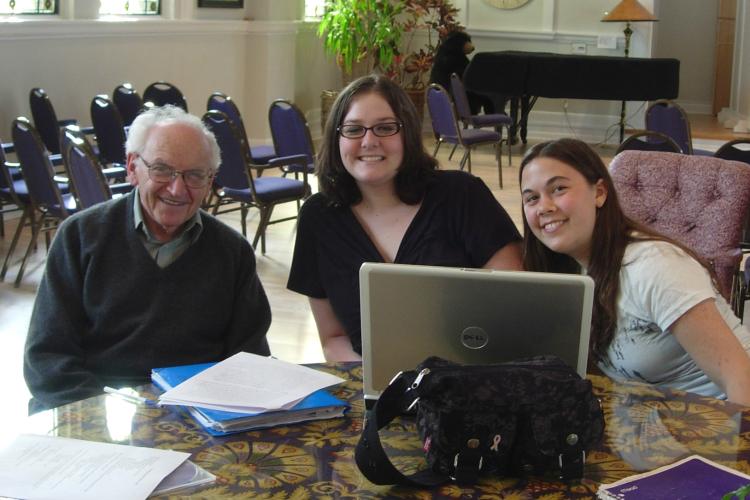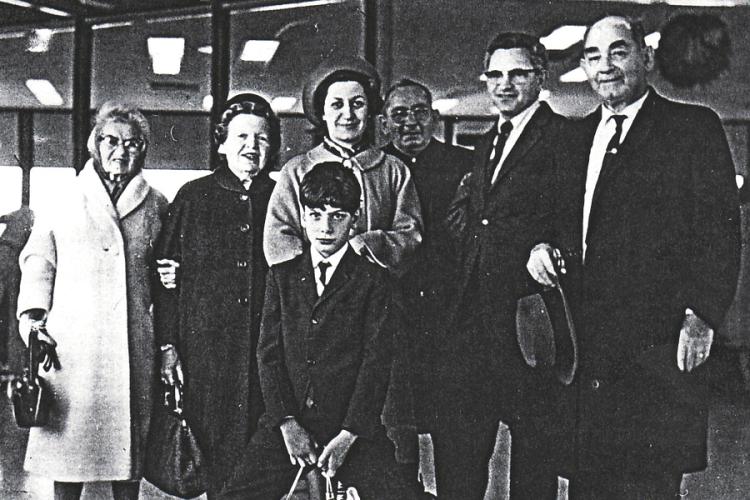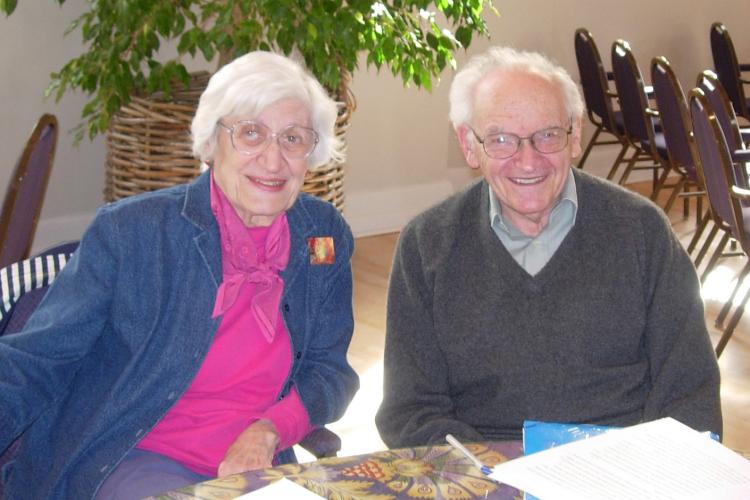Jacques Pankove
Jacques Pankove was born in Russia in 1922 and lived in France for nearly 20 years. To evade Nazi persecution, Jacques and his family came to the United States in 1942, where he became an accomplished electrical engineer and worked for RCA. Jacques is Professor Emeritus at CU in the Department of Electrical Engineering. He and his wife Ethel live in Boulder.

Jacques Pankove, Stephanie Harper, and Chelsea Bear
Click image to enlarge
In Search of the Future
I was born in Russia and then I lived a year in Turkey but the life that I remember started in Marseille. We were living a good life. My mother and I spent every summer in the lower Alps. My friends and I were able to do things like build sailboats. My father was an entrepreneur. He saw a very popular game in France called Boule. It was a game played with balls made of wood with an outer layer of upholstery nails. Although the surface was tough sometimes the wooden ball would split in half. Father thought that if the balls were made of metal, they wouldn’t split. Every year in Marseille he would enter his Boule in Trade Fairs and win a prize. It was the rank of being the winner that gave you a certificate artistically embellished. I still have one today. Father started as a blacksmith. But, in Russia, he got into some trouble with the Communists because his two employees had no soap (of course, the revolution was in progress and nobody had any soap) and was put in jail. Luckily, an influential friend got him out, but warned him to leave Russia immediately. That is what sent us to Turkey. Father ended up working on a bridge high over the Bosporus.
We were in Turkey for a year, and after Father had saved up enough money he figured we’d better move on. That is how we ended up in France. There, my father eventually had two foundries. He would service the ships that would come into Marseille. All the ships had custom-made brackets, and he would fix them or replace them. I inherited my father’s manual dexterity and creative genes. I was 20 years old when the Nazis invaded France, and our family--my parents, my younger sister Lili, and I--knew we had to get out. People were being deported to concentration camps each day, but my father’s brothers in the United States sent us visas and we got tickets on a ship to the U.S.
When I first learned we were going to the United States I was already studying English. It was very difficult to learn English because I had a hard time learning the everyday vocabulary. Words like “work,” for example. In English the every day word is “work,” but in French the word is travailler. So, when I said it in English, I said ”travail.” I had to learn the shorter words! One time in an English class I had to give a talk. I chose to give a talk on artificial insemination but my accent was so heavy that by the end of class, someone came up to me and said, “Oh, I thought you were giving a talk on artificial respiration.” My English was improved when I became fluent.

The Pankove Family
Click image to enlarge
I had two uncles, my father’s brothers, who lived in Oakland. Their families had come over much earlier from Russia. My father was the youngest of nine children. One uncle was a furrier, making fur coats. My Uncle Abe, who was also a furrier, sent our family visas. The visas allowed us to flee Marseille because we wouldn’t become a public burden when we got to America. Someone was there to take care of us. For immigrant families, it’s a necessity to keep in touch.
Our family crossed the Atlantic and came over from Marseille in 1942 on the Portuguese boat the Serpa Pinto, a ship originally built to transport cork. They had turned the cargo space into people space. I found a picture recently and although I remembered it having two, it had only one smokestack. The more powerful the ship, the more smokestacks, and ours only had one. I met my best friend on the ship; he was also named Jacques. He was walking along the deck and saw me sleeping with a science book in my lap. He opened the book to see what it was about, and it was about sleep. We became lifelong friends. I was always closest to him because we had common interests and language. Survival is always a common interest. One day on the ship, a German U Boat stopped us. They had already put some of the people on a lifeboat, and we thought they were going to sink it, but the captain radioed Berlin and they told him that we were a neutral ship.
Hoboken, New Jersey
When we got off the boat in Hoboken, New Jersey, there was a lot more food. There was rationing in the U.S, but I never knew it because there was enough meat and sugar to go around. My family got on a train to go across country to Oakland, California, and it was hard because everything was so new to me. People were not only talking differently but thinking differently. In Oakland, we rented apartments for a while and then actually moved into a house. When we lived in apartments, there were several families living on the same floor. This was different. We had had a house to ourselves in Marseille so this was hard to get used to. My uncles and cousins all lived close so we saw them often. This helped with the language and learning customs. My uncles were already assimilated. There was even a weekly Pinochle game amongst my father and his brothers. I never learned it because my father feared I might become a gambler.
For me, it was easy to adapt. I made a lot of friends at the University of California at Berkeley, where I began studying electrical engineering. We were all classmates so it was very simple. I lived in the International House, which was like a dorm, but for people from different countries. Everyone had different interests and stages of education, so we were not constantly together. There were students not only from Europe but from South America and Asia too. I had a room and I ate there. Sometimes there were plays. It was left to the initiative of the creative students. Once, I staged a play by Courteline, a French playwright who was a comedian, who wrote about life. I was a policeman, something like a Charlie Chaplin.
It was much harder for my parents. My sister Lili, being only ten, learned the ways of America a lot faster than they did. I was often the intermediary between her and my parents when she wanted to go to a pajama party or something like that. This was something they didn’t understand. My sister and I have always been very close. I was always her babysitter and a kind of second father. We still talk every Sunday.

Ethel and Jacques Pankove
Click image to enlarge
It was very hard for my father to adjust to the new customs. For example, in Russia and France, he was the pater familias. His wife had never had to go out to work and that was a sign that he was a good provider. Even when we came to America she never worked. She worked very hard maintaining the home, sewing, and cooking. But, she was modern in her own way too. She adjusted to things like frozen dough in her cooking, which was not something she had used in France. I married a professional woman and it was very different. My father and I had a disagreement about that. He thought that when our children were naughty, it was because Ethel wasn’t home.
Over time my father grew accustomed to an independent daughter in law and a wife who had become adapted to an American way of running the household. He eventually established a new and used building materials store and was very popular with his customers, who would come in and ask, “Where’s the old man?” He sometimes relaxed by watching wrestling on television. After all, life is full of struggles and adjustments.

